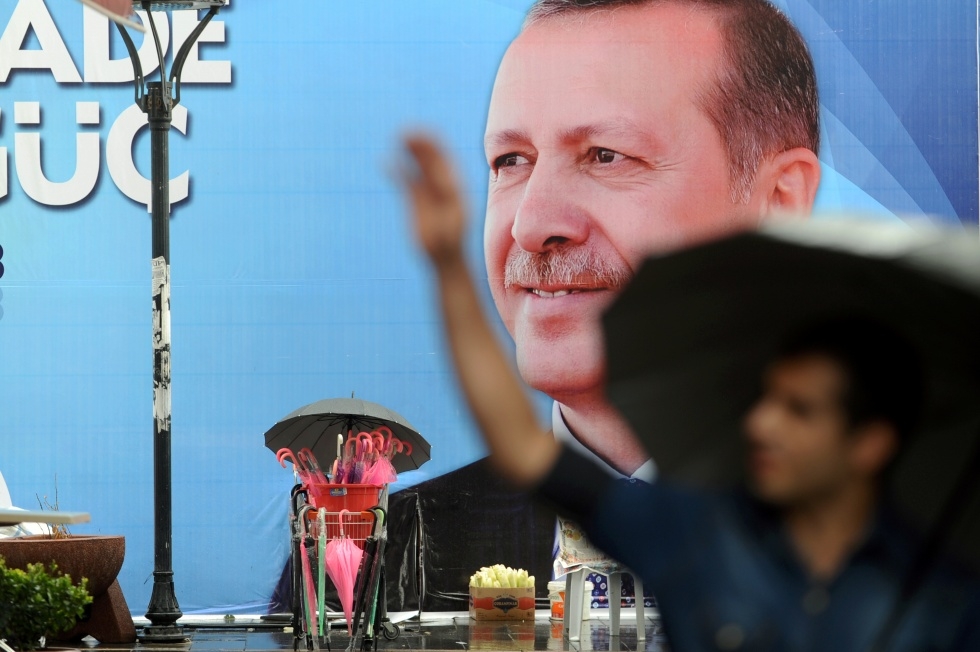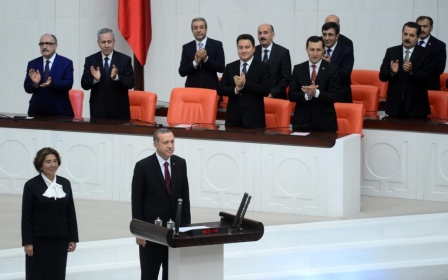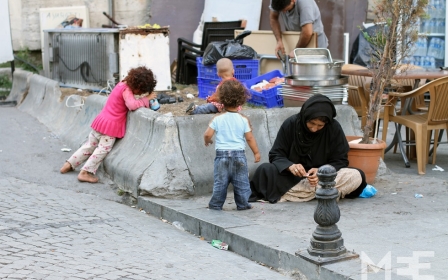Lofty vision, modest attendance at Erdogan’s oath-taking ceremony

Billed in advance as the opening of a new dawn in the life of the country, Recep Tayyip Erdogan's oath-taking on Thursday once again reflected Turkey’s highly polarised political life. Deputies from the country’s main opposition party, the Republic People Party (CHP), marched out of the Assembly just before the oath swearing, though only after one of its members had hurled the Parliament’s Rule Book at the feet of the president of the assembly, Cemal Çiçek.
The leader of the opposition, Kemal Kılıçdaroglu, declared stingingly that he would not witness a false oath, having sworn on his honor and integrity to abide by the Constitution. But his words made no practical difference.
They - and the rule-book throwing gesture - summed up the somewhat hopeless legalism of the opposition’s attitude. In terms of precedent, the opposition undoubtedly has a point. Erdogan did not, as has always happened in the past, step down temporarily from office while campaigning for the presidency. Nor did he immediately give up his leadership of the Justice and Development Party (AKP) and the prime minister’s office when he was elected on 10 August as a strict reading of the election law suggests he might have done.
Consequently, the line between government and party has become somewhat blurry, but the AKP has pushed ahead without any anxieties on this point. Just when Erdogan ceases to be prime minister, still seems to be uncertain, though Davutoglu is already regarded as acting prime minister. But the outgoing cabinet has not resigned.
Erdogan, elected to what is at present still only a non-party and non-executive figurehead position according to Turkey’s constitution, has made it clear that he views the post as a hands-on appointment. In the Ataturk Forest Farm, one of the main green areas of Ankara, much of the wood has been felled to make way for an enormous new building which is still officially described as a new prime ministerial office, but looks very much like the intended seat of an executive presidency.
As far as links with the party go, Erdogan makes it clear that he intends to retain at least ties of sympathy with the ruling Justice and Development Party, which he referred to as “his love.” On Wednesday, he gave a valedictory address lasting nearly three hours to party delegates as they elected Ahmet Davutoglu, the outgoing foreign minister, as his successor by 1,382 votes to six. The six were spoilt ballot papers. There were no other candidates - an approval rating of over 99 percent as opposition journalists were quick to point out.
“Only the name of the chairman is changing in our party,” Erdogan told a cheering crowd of AKP faithful. “The excitement will be the same. Our goals are the same . . . The AKP is not just a party of Turkey. It is also a world party.”
He and Davutoglu have both been issuing mixed signals about what the handover will mean for Turkey. Erdogan has stressed several times that, although he has been in power for nearly 12 years, his elevation to the presidency will mean the beginning of a new Turkey. But before he took his oath on Thursday, he paid the customary visit to the mausoleum of Kemal Atatürk, paying his respects to the founder of the Turkish Republic in the sort of political ceremony which dominated Turkey’s life before the AKP took power in 2002. He also wrote a message to the founding father.
But the previous day, Davutoglu delivered a distinctly un-Kemalist sounding message, promising to bring “restoration” to Turkey, referring to the interval between the establishment of the Republic in 1923 and the AKP election victory of 2002 as an “interregnum.” Davutoglu announced nine goals for his time in office, ranging from preventing coups, guaranteeing civil liberties and freedom of speech, as well as educational and economic reforms.
The two main immediate priorities however, seem to be to continue the peace process with the Kurds and the purging of the Gulen movement from the civil service and judiciary. No one doubts that the country will basically be ruled by the president.
Relations with the Kurds and the future of the peace process remain highly precarious; though Abdullan Ocalan, the jailed PKK leader, is believed to be eager to strike a deal which would see him released from his prison in the Sea of Marmara to house arrest in Diyarbakır, many ordinary Kurds are disturbed by the Turkish government’s failure to assist them in battles along Turkey’s southern frontiers in northern Iraq and Syria against the Islamic State over the last year.
Two policemen were shot dead in separate incidents in Diyarbakır, the regional capital of southeastern Turkey on Monday, while a journalist hostile to the PKK was reported kidnapped. These events are an uncomfortable reminder that after months of calm, violence could easily return to southeastern Turkey if the Kurds do not get what they want.
Such concerns were temporarily banished on Wednesday afternoon at a grandiose hand-over ceremony in the presidential palace, described by a former foreign minister as “more appropriate to a monarchy than a republic.” The outgoing president, Abdullah Gul, welcomed Erdogan as a friend who had fought with him for the same dawa (cause) for four decades.
Attended by statesmen from more than 53 countries, the ceremony offered a mirror-image of Turkey’s relations with the rest of the world after 12 years of AKP rule. The US was represented only by its chargé d’affaires, but Sergey Lavrov, the Russian foreign minister, and Karl Ernst Thomas de Maizière, the German minister of the interior were there. So too was Edward Nalbantian, the foreign minister of Armenia. Arab countries were thinly represented, despite Turkey’s placing the Middle East at the heart of its foreign policy, but nine presidents and eight prime ministers, mostly from Turkey’s northern neighbors and its friends in Asia were expected.
US representation at previous state ceremonies in Turkey has often been surprisingly modest, so the absence of a visitor from the US is not necessarily a powerful signal and a State Department spokesman on Wednesday played down suggestions from journalists that it was. Nonetheless, President Erdoğan recently complained that he no longer enjoyed his former easy access to the White House. The low American profile at the presidential handover will certainly raise eyebrows about the current state of the US-Turkish partnership as Erdogan begins his presidency.
David Barchard has worked in Turkey as a journalist, consultant, and university teacher. He writes regularly on Turkish society, politics, and history, and is currently finishing a book on the Ottoman Empire in the 19th century.
The views expressed in this article belong to the author and do not necessarily reflect the editorial policy of Middle East Eye.
Photo credit: Erdogan on the presidential campaign trail earlier this year (AFP)
New MEE newsletter: Jerusalem Dispatch
Sign up to get the latest insights and analysis on Israel-Palestine, alongside Turkey Unpacked and other MEE newsletters
Middle East Eye delivers independent and unrivalled coverage and analysis of the Middle East, North Africa and beyond. To learn more about republishing this content and the associated fees, please fill out this form. More about MEE can be found here.




